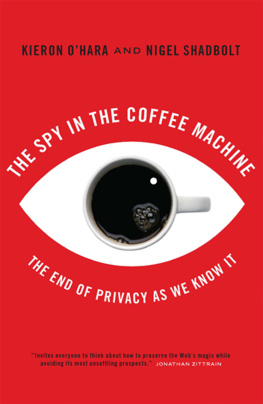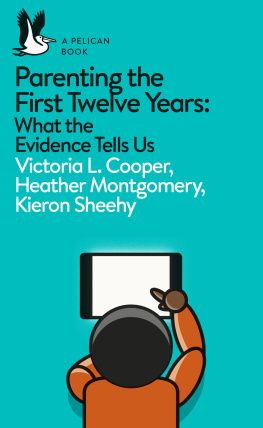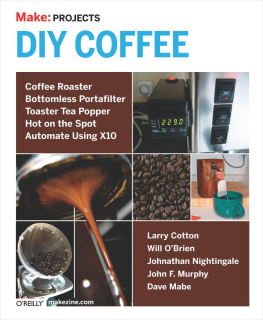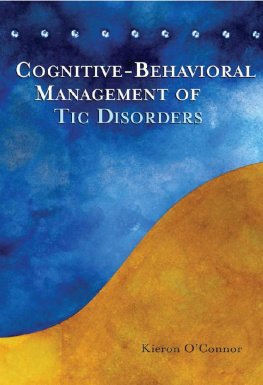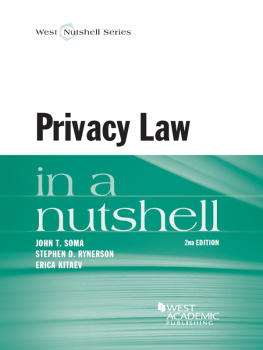THE SPY IN THE COFFEE MACHINE
Kieron OHara and Nigel Shadbolt have offered an engaging and thought-provoking roadmap for the emerging field of Web Science. They crisply survey what lies ahead as the Web becomes ubiquitous, and they invite everyone not just academics and experts to think about how to preserve the Webs magic while avoiding its most unsettling prospects.
Jonathan Zittrain, Professor of Internet Governance and Regulation, Oxford University
Worried about the potential effect of new digital technologies on your personal privacy? Providing the most up-to-date information on this fascinating debate, the authors explore how technology has been infiltrating and changing our society.
Fred Piper, Director of the Royal Holloway Information Security Group, University of London
an insightful commentary on what technology can do and on what individuals can do to protect themselves from unwanted intrusions made possible by new digital technologies.
Robin Mansell, Head of the Department for Media and Communications, London School of Economics and Political Science
The Spy in the Coffee Machine is an invaluable work for those of use who care about privacy but are baffled by technology.
Gareth Crossman, Director of Policy at the human rights organization Liberty
This forward-looking book will introduce you to concepts like the Semantic Web, AJAX, Web 2.0, and pervasive computing all terms you need to know about to protect yourself online AND to get the most out of the Internet. The Web we know today is only the beginning!
Robert Ellis Smith, Publisher of the Privacy Journal newsletter since 1974
ABOUT THE AUTHORS
Kieron OHara is Senior Research Fellow in Electronics and Computer Science at the University of Southampton, UK. He is the author or coauthor of nine other books about technology, politics and society, including Inequality.com: Power, Poverty, and the Digital Divide, also published by Oneworld.
Nigel Shadbolt is Professor of Artificial Intelligence at the University of Southampton, UK, and was President of the British Computer Society in its 50th anniversary year 20062007. He is Chief Technology Officer of Internet security firm Garlik, and a director of the Web Science Research Initiative. He is both a chartered psychologist and a chartered engineer, and sits on a number of UK national science and technology committees.
THE SPY IN THE COFFEE MACHINE
KIERON OHARA
AND
NIGEL SHADBOLT
A Oneworld Book
First published by Oneworld Publications, 2008
This ebook edition published by Oneworld Publications, 2014
Copyright Kieron OHara and Nigel Shadbolt, 2008
All rights reserved
Copyright under Berne Convention
A CIP record for this title is available
from the British Library
ISBN: ISBN: 9781780747347
Cover design by Keenan Design
Oneworld Publications
10 Bloomsbury Street
London WC1B 3SR
England
Stay up to date with the latest books,
special offers, and exclusive content from
Oneworld with our monthly newsletter
Sign up on our website
www.oneworld-publications.com
CONTENTS
PREFACE
The relationship between society and technology is complex, particularly as each has unpredictable effects on the other. We, as technologists, can talk until we are blue in the face about what is possible, or will be possible in the next few years. Thats our favourite subject. But what will people want to use? What technologies will fit into particular social niches? What technologies will remould society in their own images? These are tricky questions, and the correct answers can make you very rich. Wrong guesses, in a dynamic industry, can kill a firm or a reputation stone dead. Potential is huge, but not all nifty gizmos can define the future.
The need to understand these looping influences between society and technology has led to the evolution of a new discipline: Web Science. The Web is, in effect, a series of protocols defining how different computers talk to each other, but those protocols have massive real-world effects, which in turn create demands for new protocols and technologies. The aim of the recently-created Web Science Research Initiative, a joint venture between the University of Southampton and the Massachusetts Institute of Technology, is to hone the intellectual tools to study these developmental cycles. This book is part of the Web Science programme.
There are two things that technologists can be reasonably confident about. First, given enough history (and the electronic computer now does have a decent history behind it one of us has recently been privileged to serve as the President of the British Computer Society in its 50th year), we can identify general trends. And second, understanding what is possible will tell us what social norms and attitudes are under threat. If a technology is sufficiently widespread, and becoming more so, then it may be that a particular set of cultural or political assumptions is no longer tenable.
It is our contention that privacy, since the Enlightenment a key pillar of the liberal ideal, is one of these somewhat obsolete norms in the face of the rapid spread of information technology. Information about one can be stored, found and passed around with almost trivial ease, and it is getting increasingly hard for the subject to retain control.
This means a political rethink, for sure. But it is not our contention that we are about to descend into a Nineteen Eighty-Four-style nightmare. It is cultural determinism of the worst sort to assume that society, politics and philosophy cannot adapt to the technology, and outright pessimism to suggest that the technology cannot be brought to heel by a sufficiently vigilant, engaged and educated society.
What is true is that the twentieth-century ideal of the private space will need to evolve, and that, if we truly value our privacy, we will have to play a much more active role in keeping it in place. The technologies that threaten can also be used to protect, and awareness is an important factor in their advantageous deployment. Education is vital; so is a public spirit (some of the gains from privacy accrue more to the community as a whole than to the individual, and therefore sometimes preserving privacy is a matter of altruism or social responsibility). Fatuous claims of the if you have nothing to hide you have nothing to fear sort need to be resisted just as much as the puerile conspiracy theories that plague our political discourse.
We need debate, but for that debate to be worth having we need a much greater level of awareness of the technology to be diffused throughout society. This book is a small contribution to that task.
The field which we have surveyed is a wide one, and of course we have incurred many intellectual debts in our researches. A full list of acknowledgements would be prohibitively large, but in particular we would like to thank Wendy Hall, Brian Collins, Tim Berners-Lee, Tom Ilube, Pete Bramhall, Fred Piper and Kenny Paterson, members of the EPSRC Memories for Life network, the Office of Science and Technologys Foresight Programme on Cyber Trust and Crime Prevention, the Information Assurance Advisory Council, and the Defence Science and Technology Laboratory, and audiences at the 19th Hewlett-Packard Symposium on Information Security, the Royal Military College of Science, Shrivenham and the Bournemouth Media School. Many thanks also to Susan Davies (as ever), and Marsha Filion of Oneworld.


